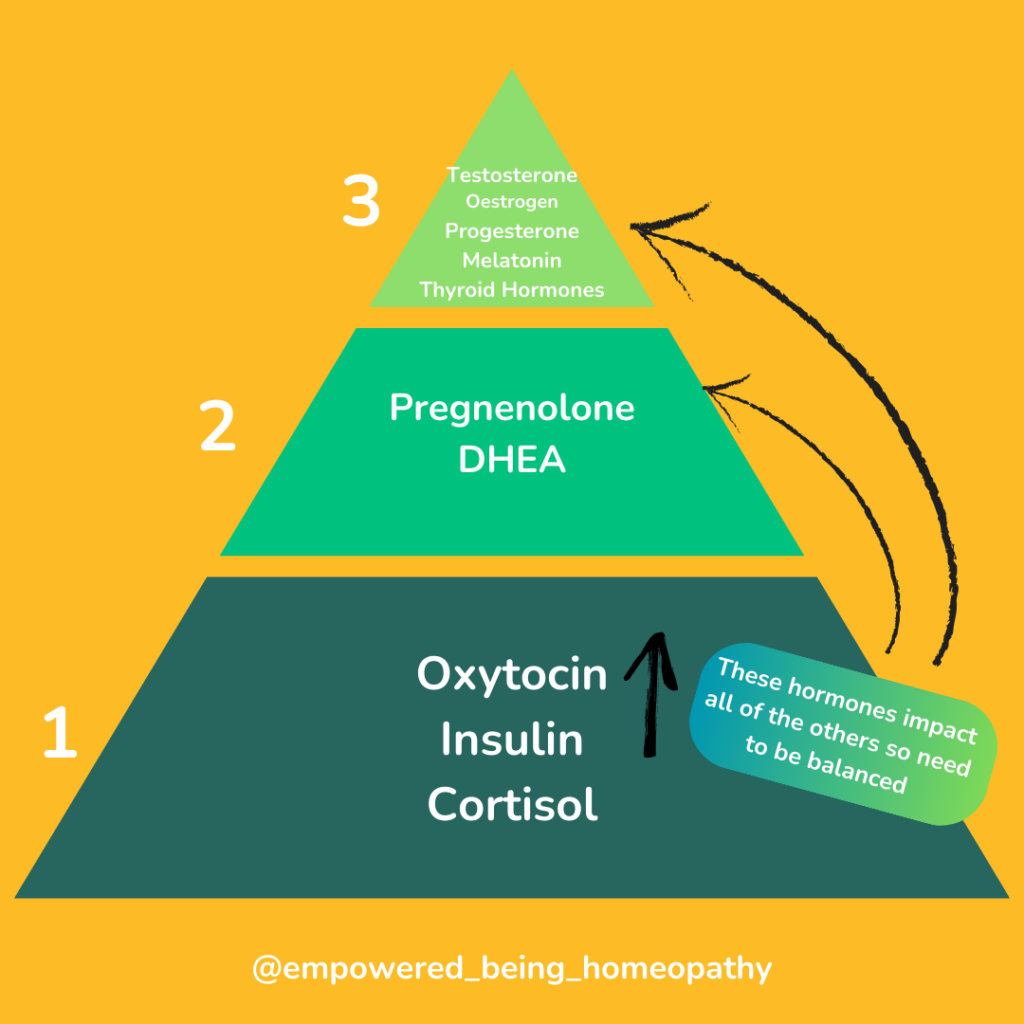Hormones are potent chemical messengers that influence nearly every aspect of your health, from metabolism and mood to reproduction and sleep.
For women, understanding the delicate balance between these hormones is essential for achieving optimal well-being. In this blog, we’ll explore the hormone hierarchy and delve into the relationships between oestrogen, progesterone, testosterone, melatonin, thyroid hormones, pregnenolone, DHEA, oxytocin, insulin, and cortisol.
1. Pregnenolone: The Mother of All Hormones
Pregnenolone is often called the “mother hormone” because it is the precursor to many other hormones, including cortisol, DHEA, and the sex hormones (oestrogen, progesterone, and testosterone). As the cornerstone of the hormone hierarchy, pregnenolone helps maintain hormonal equilibrium. However, chronic stress can redirect pregnenolone production towards cortisol, reducing the availability of other essential hormones.
2. DHEA: The Building Block for Sex Hormones
DHEA (dehydroepiandrosterone) is a critical precursor for oestrogen and testosterone. Its levels naturally decline with age, impacting energy, libido, and overall vitality. For women, DHEA helps maintain a healthy balance between oestrogen and testosterone, supporting mood, bone density, and muscle strength.
3. Cortisol: The Stress Manager
Cortisol, often referred to as the “stress hormone,” is essential for managing stress, regulating metabolism, and controlling blood sugar. Prolonged stress leads to elevated cortisol levels, which can disrupt insulin sensitivity, impair thyroid function, and deplete sex hormones, affecting overall hormonal balance. Over time, the body may become less sensitive to cortisol, leading to a potential dip in its levels, which can contribute to adrenal fatigue and an overall imbalance in the stress response.
4. Testosterone: Small but Mighty
Although testosterone is commonly associated with men, it plays a crucial role in women’s health too. It supports bone density, muscle strength, energy levels, and libido. Imbalances in testosterone—whether too high (as seen in PCOS) or too low—can lead to fatigue, reduced sexual desire, and even mood disturbances.
5. Insulin: The Metabolic Regulator
Insulin is vital for regulating blood sugar levels. Insulin resistance, often caused by poor diet, stress, or lack of exercise, can lead to weight gain, elevated testosterone, and conditions like PCOS. Maintaining insulin sensitivity is key to supporting hormonal harmony.
6. Melatonin: The Sleep Hormone
Melatonin regulates your sleep-wake cycles, playing a vital role in your body’s circadian rhythm. Poor sleep disrupts melatonin production, which can elevate cortisol and throw other hormones off balance. Ensuring good sleep hygiene is critical for maintaining hormonal health.
7. Thyroid Hormones: Masters of Metabolism
Thyroid hormones (T3 and T4) regulate metabolism, energy, and body temperature. Their function is closely linked to cortisol, insulin, and sex hormones. Hypothyroidism or low thyroid function can lead to fatigue, weight gain, and menstrual irregularities, demonstrating the interconnected nature of these hormones.
8. Oxytocin: The Bonding Hormone
Oxytocin, often called the “love hormone,” is key to emotional bonding, childbirth, and breastfeeding. It counteracts stress by reducing cortisol levels and promotes feelings of trust and empathy. Stress can suppress oxytocin, impacting emotional well-being and relationships.

Hormones are intricately linked and work best when they are all in balance. Any imbalance, particularly those in the lower tier, such as cortisol and insulin will disrupt the entire hormonal system. These need to be balanced first ideally. The hormones in the top tier depend entirely on the hormones in the lower two tiers to be balanced before they work effectively.
So if you are struggling with constant stress, the production of cortisol will impact your entire hormonal system.
How to Maintain Hormonal Balance
Achieving hormonal harmony requires a holistic approach:
- Stress Management: Practices like mindfulness, yoga, and adequate sleep help lower cortisol and support overall balance.
- Nourishing Diet: Focus on whole foods, healthy fats, and proteins to maintain insulin sensitivity and hormone production.
- Regular Exercise: Moderate activity helps balance insulin, reduce cortisol, and support testosterone levels.
- Prioritise Sleep: Establishing a consistent bedtime routine can improve melatonin production and overall hormonal health.
- Social Connections: Nurturing relationships boosts oxytocin, enhancing emotional well-being.
- Homeopathic Support: Tailored homeopathic remedies and supplements like magnesium, omega-3s, and B vitamins can support adrenal and thyroid health.
Conclusion
The hormone hierarchy is a finely tuned and interconnected system, where balance is crucial for optimal health. Hormones like oestrogen, cortisol, melatonin, insulin, and testosterone don’t work in isolation—they influence and depend on one another. Factors like stress, poor sleep, and lifestyle choices can disrupt this delicate balance, leading to symptoms such as fatigue, weight gain, mood swings, and irregular cycles.
💡 How Homeopathy Helps: Homeopathy works with your body to gently restore balance, addressing the root causes of hormonal imbalances. Whether it’s stress, sleep, or cycle-related, remedies are tailored to your unique needs, helping your body find its natural rhythm and empowering you to feel your best.
By adopting a holistic approach that includes stress management, nourishing nutrition, regular exercise, and supportive therapies like homeopathy, you can restore hormonal harmony and achieve overall well-being. If you’re experiencing symptoms of imbalance, reach out to a qualified homeopath or healthcare provider for a personalized plan to restore vitality and health.


